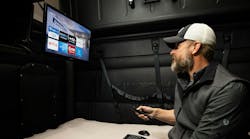Most people associate the names Swift Transportation, Schneider National, and J.B. Hunt with longhaul trucking. What they don't realize, however, is that all three are becoming major players in the world of railroad freight, specifically when it comes to intermodal shipments.
While intermodal is broadly defined as the movement of goods by more than one mode of transportation, such as ocean carrier to railroad or air carrier to truck, the term is now most commonly associated with freight that moves by a combination of rail and truck.
For much of their history in the U.S., the railroad and trucking industries have been at loggerheads, fighting tooth and nail for longhaul freight. Today, however, there's been a broad shift in those attitudes, largely as a result of the max'ing out of rail capacity. That factor has helped new cooperative intermodal ventures between railroads and fleets, though both still compete furiously in many of the same markets.
In December of last year, the Burlington Northern and Santa Fe Railway Co. (BNSF) and TL giant Swift Transportation Co. joined forces to offer intermodal services for perishable commodities. The two companies have initially provided temperature-controlled services moving between the West Coast, the Midwest and the Southeastern U.S., with BNSF providing boxcar transportation services for longhaul moves and Swift providing shorthaul highway transportation.
“Today, many shippers are hesitant to use a rail/truck transportation package because of the complexity of having to coordinate with multiple parties,” says Chuck Schultz, BNSF executive vice president and chief marketing officer. “We hope to make the transportation process seamless by providing one point of contact to make bimodal shipping easier and more economical.”
In the past, the Achilles' heel of intermodal service has been the conflict between delivery time and cost. Generally, it has been less expensive to ship goods via an intermodal combination than by truck alone. However, as rail capacity diminished during the 1990s and freight demand increased, transit times took a beating, leaving many shippers reluctant to use intermodal options.
“Until now, truck-level service and truck-level transits have not generally been associated with intermodal business,” says Tom Bartel, director of TruckRail Express at Schneider National. “Standard intermodal providers are generally not able to offer transits and reliability equal to a truck as traditional intermodal transit is usually a day slower than over the road.”
Schneider is trying to change that by combining truck-level transit times of 500 to 600 miles per day with intermodal-level savings through TruckRail Express, introduced late last year. The service is offered for direct routes with origins east of Kansas City to destinations in California, Oregon, and Washington.
According to the Railroad-Shipper Transportation Advisory Council, deregulation of the rail industry in 1980 allowed it to close unprofitable rail lines and better control pricing. Since then, however, rail capacity has shrunk 36%, while total tonnage jumped 41%.
That's why truckers have been eager to develop joint intermodal service offerings, many with healthy financial results. J.B. Hunt Transportation Services is a prime example. Despite declining trucking revenues over the last half of 2001, its intermodal service has shown robust growth. During the third quarter of 2001, revenues of J.B. Hunt's trucking operations grew 1%, while its intermodal revenues rose 9% compared to the same period in 2000.
Those results, posted in the face of an economy in recession, may encourage more fleets to whistle a new intermodal tune in 2002.


